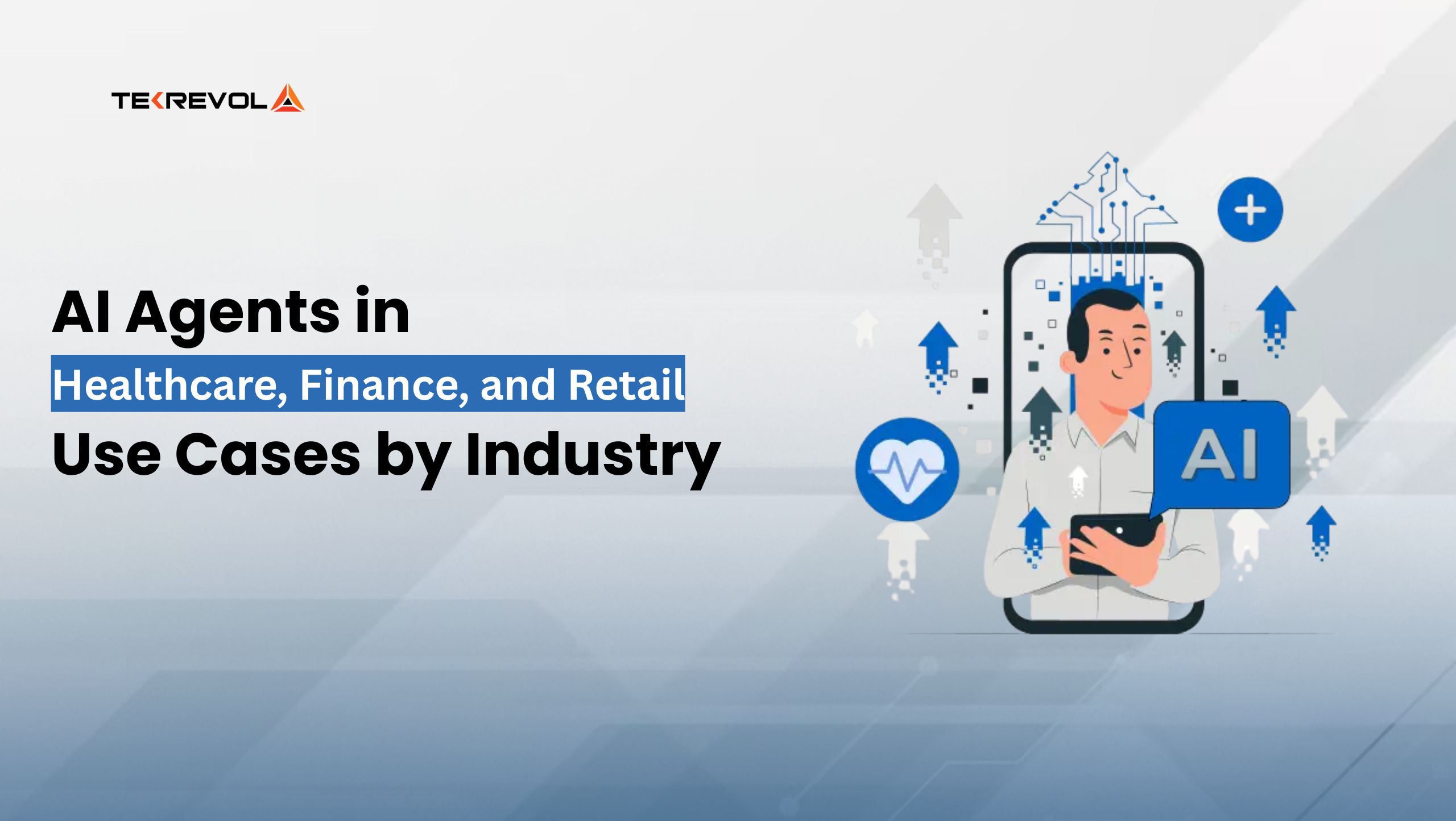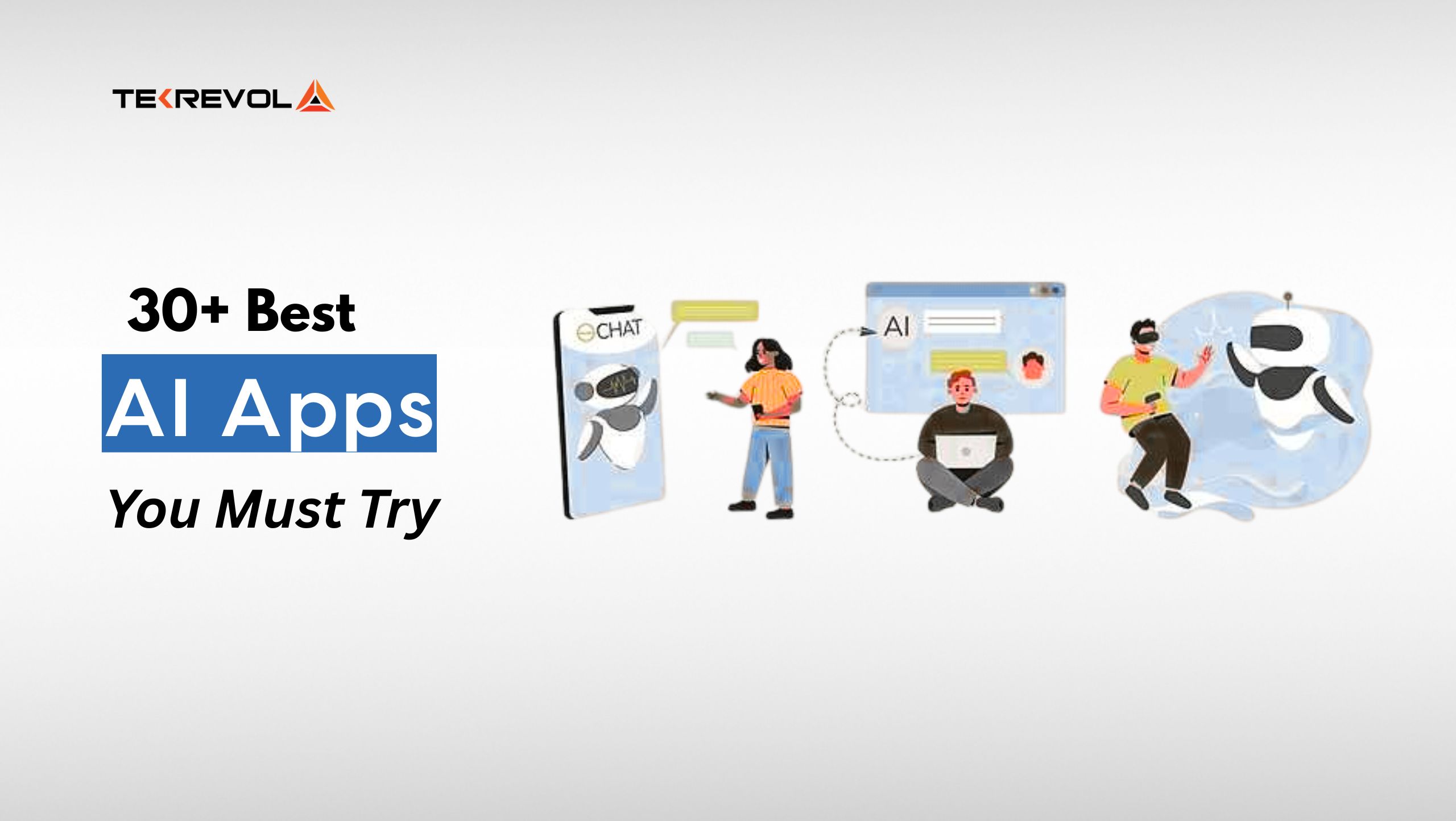Are you noticing the shift that AI brought? It’s not just hyped anymore; AI agents are showing up in ways that actually matter, especially in industries like healthcare, finance, and retail.
These agents aren’t theoretical anymore. They’re actively deployed, handling sophisticated tasks that once required large teams.
Think about it: AI in the healthcare industry provides virtual nurses offering 24/7 patient support, AI systems flagging fraudulent transactions in milliseconds, or digital shopping assistants tailoring recommendations just for you. It’s happening now, and it’s working. In fact, over 80% of businesses say AI has already helped them stay competitive, according to McKinsey.
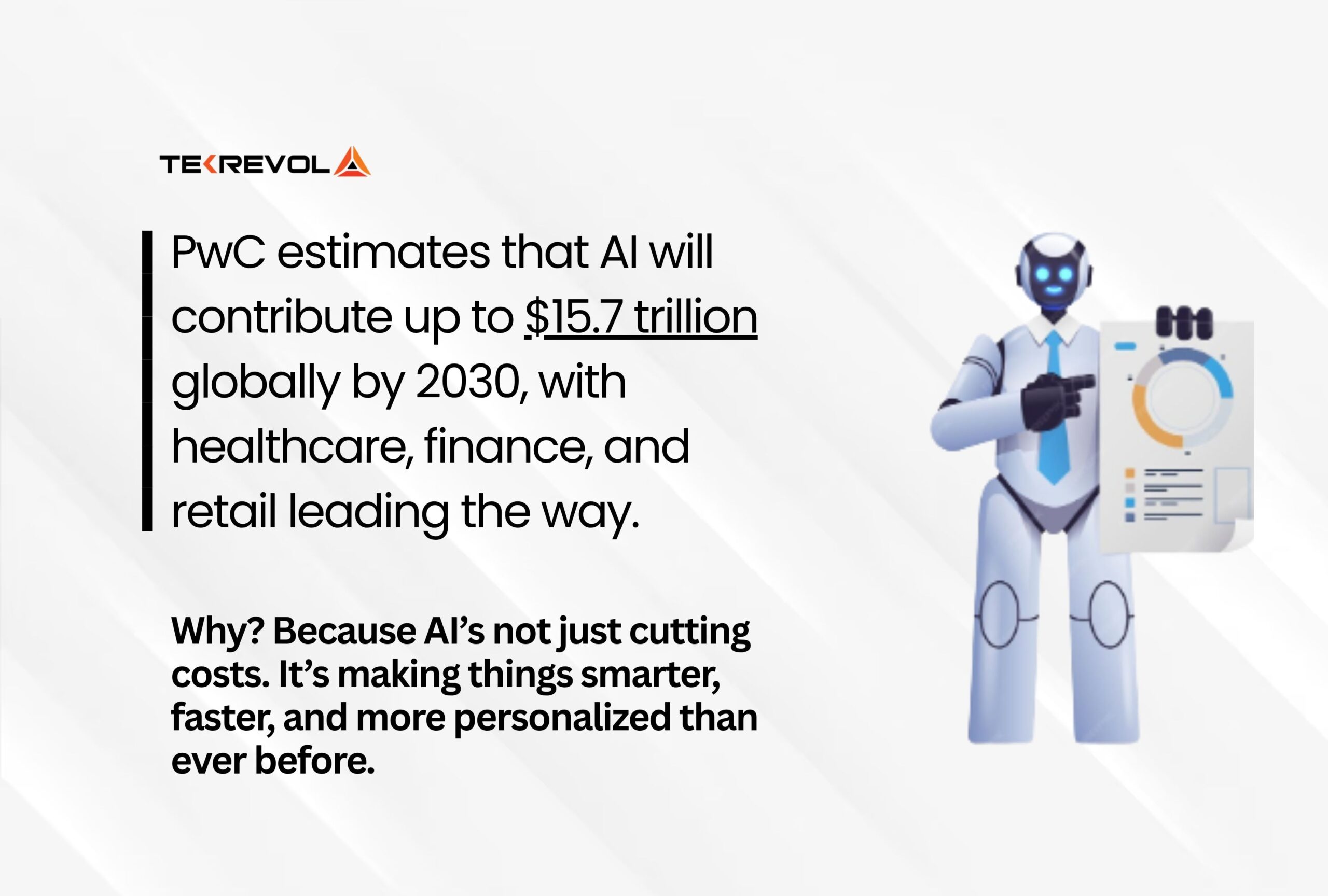
But here’s the catch: many businesses are still stuck trying to figure out where AI agents actually fit in. What tasks can be automated safely? Which processes benefit from AI autonomy? And how do you align all this with industry regulations and customer expectations?
In this blog, we’ll explore real-world, high-impact use cases of AI agents in three core industries, healthcare, finance, and retail, and show how they’re being used to solve real-world problems.
AI agents are saving industries millions in operational costs annually.
We help you design intelligent systems that streamline operations and boost ROI.
Book a free consultation!Why AI Agents Are a Good Investment in 2025?
AI agents aren’t hype, they’re driving measurable ROI across sectors. Whether providing healthcare automation tools, streamlining financial decision-making, or improving customer experiences in retail, AI agents are emerging as a strategic business asset for those willing to scale smart in 2025.
Sudden Market Expansion: The AI agent marketplace is anticipated to expand from $7.38 billion in 2025 to $47.1 billion by 2030, at a CAGR of 44.8%.
Increased Enterprise Adoption: 1 out of every 4 companies leveraging generative AI will start piloting agentic AI solutions by 2025, and this is likely to double to 50% by 2027, says Deloitte.
Major Economic Consequences: McKinsey predicts that an agent-based model of AI has the potential to contribute up to 4.4 trillion in global productivity per year, automating tasks, workflows, and decision-making.
What Can AI Agents Actually Do in Healthcare? Key Use Cases
AI agents are quickly growing to be necessary agents in the healthcare ecosystem. The significant high-impact use cases are listed below, which demonstrate how AI agents work and what value they bring.
For a deeper dive into how cutting-edge AI technologies like generative AI are transforming healthcare, check out our blog: How Generative AI Can Help the Healthcare Industry.
1. Medical Diagnosis Systems
AI in medical diagnostics is being increasingly used to augment diagnostic accuracy by processing medical images, lab tests, and patient histories at scale. These systems help physicians by indicating early warning signs of diseases such as cancer, heart disease, or neurological conditions, even before symptoms reach maturity in some cases.
How it helps:
- Reduces error in diagnoses and enables early detection
- Shortens the time to correct the diagnosis
- Helps under-staffed clinics with minimal specialist access
2. Custom Treatment Design
AI agents process patient-specific information, including genetic markers, habits of living, and history of treatment, to recommend individualized care plans. This move from the generic to precision medicine enhances outcomes significantly.
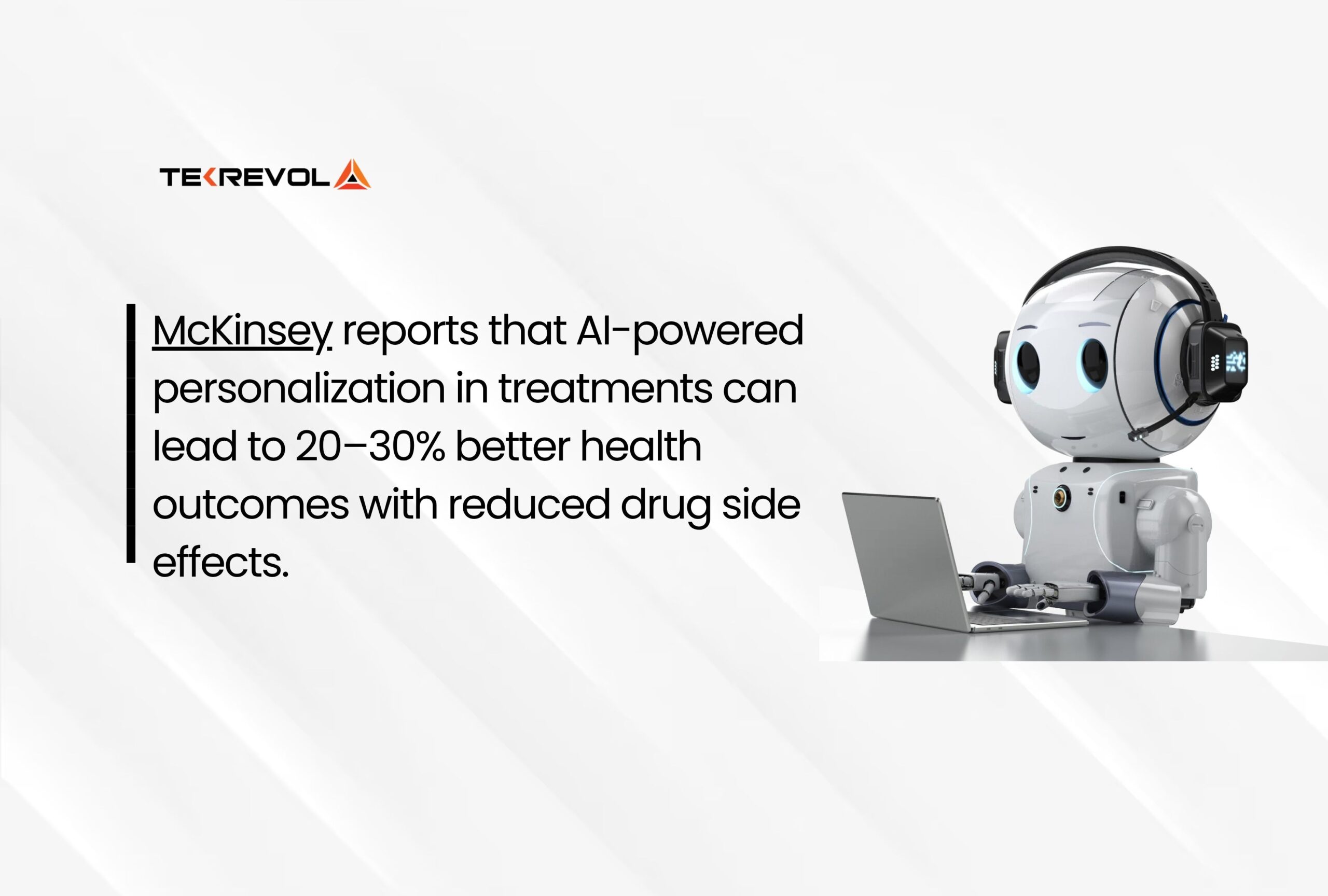
How it assists:
- Personalizes therapy according to individual requirements
- Improves doctor decision-making based on data insights
- Lowers trial-and-error in choosing treatments
3. Health Support through Digital
In addition to treatment and diagnostics, AI is transforming day-to-day health monitoring. Wearable mobile app solutions powered by Artificial Intelligence are helping patients track their vitals, taking medications, dieting, and even their emotional mood, which gives them home health support 24/7.
To go deeper into the future of AI in healthcare, such as long-term industry changes and the trends in technology, check our expert-informed insight: AI-Enabled Transformation: The Future of Healthcar.e
How it benefits:
- Enables patients with self-monitoring devices
- Enhances chronic disease control
- Encourages medication compliance and follow-ups
4. Office Task Automation
Doctors and nurses usually spend hours on paperwork, claims handling, and scheduling. High accuracy with which AI agents can carry out these little chores frees the team to focus more on providing patients with care.
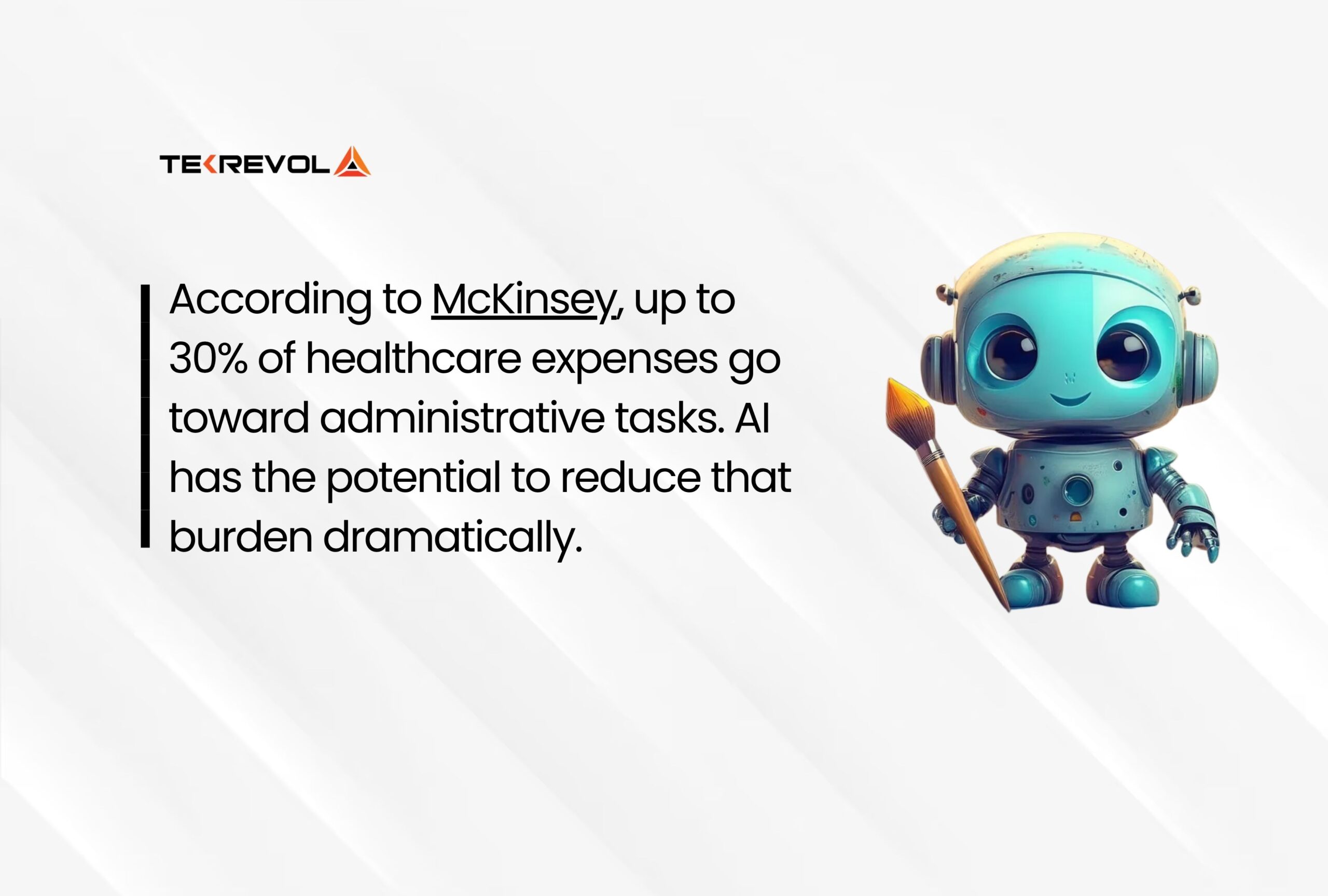
How it helps:
- Automates billing, coding, and scheduling
- Boosts staff productivity and satisfaction
- Eliminates administrative delay and mistakes
5. Virtual Health Assistants and Chatbots
AI chatbots are transforming how healthcare companies engage with patients, from answering questions to setting appointments and sending reminders.
How it helps:
- Decreases staff workload
- Offers constant patient assistance.
- Enhancement of user experience and reaction times
6. Predictive Analytics for Disease Prevention
Apart from early warnings, predictive artificial intelligence algorithms use lifestyle, genetics, and geography to assess a patient’s chances of developing diabetes, heart disease, among other diseases.
How predictive analytics in healthcare benefits:
- Helps with risk-based screening and monitoring
- Using early intervention avoids problems.
- Allows insurers and providers to save on long-term costs
7. Robotic Surgery Assistance
Artificial intelligence-powered robotic systems are enabling surgeons to execute complex operations by increasing precision, lowering invasiveness, and shortening recovery time.
How it helps:
- Increases accuracy during surgery
- Decreases hospitalization and recovery periods
- Lessens post-operation complications
8. Drug Discovery and Development
AI hastens the historically lengthy drug development process by modeling how molecules interact and makes predictions of possible drug candidates more precisely.
According to research, AI discovered a promising drug target in 46 days, dramatically cutting down the time compared to conventional approaches.
How it helps:
- Reduces R&D time and expense
- Finds new compounds quicker
- Boosts clinical trial success rate
9. Automated Clinical Documentation
Physicians spend most of their time recording patient visits. AI can now automatically transcribe and organize clinical notes, taking the workload off healthcare professionals.
How it helps:
- Accelerates medical recordkeeping
- Decreases burnout and time stress
- Enhances documentation accuracy
10. Mental Health Support
AI agents are now providing conversational therapy, mood monitoring, and stress management functions, particularly helpful for patients with limited human therapist access.
Woebot, a mental health chatbot AI, proved in a Stanford study that users had a notable decrease in depression and anxiety symptoms after only two weeks.
Mental health is one of the most promising areas for AI agent integration. If you’re planning to develop a mental health app, explore our detailed guide: Guide on Mental Health Apps: Development Ideas, Cos, and Monetization.
How it helps:
- Expands access to mental health care
- Decreases stigma with private, 24/7 engagement
- Facilitates early detection and intervention
Hospitals using AI agents report 20–25% faster patient intake and processing..
Build your own HIPAA-compliant AI assistant with TekRevol.
Talk to Our Experts!How are AI Agents Transforming Retail Operations? Key Use Cases
The current market environment gives retail businesses a challenging landscape to deal with, including unforeseen demand, efficient logistics, inventory control, and fluid omnichannel experiences.
That is where AI agents step in, as intelligent assistants, that automate work, personalize interactions, and make decisions in real-time at scale.
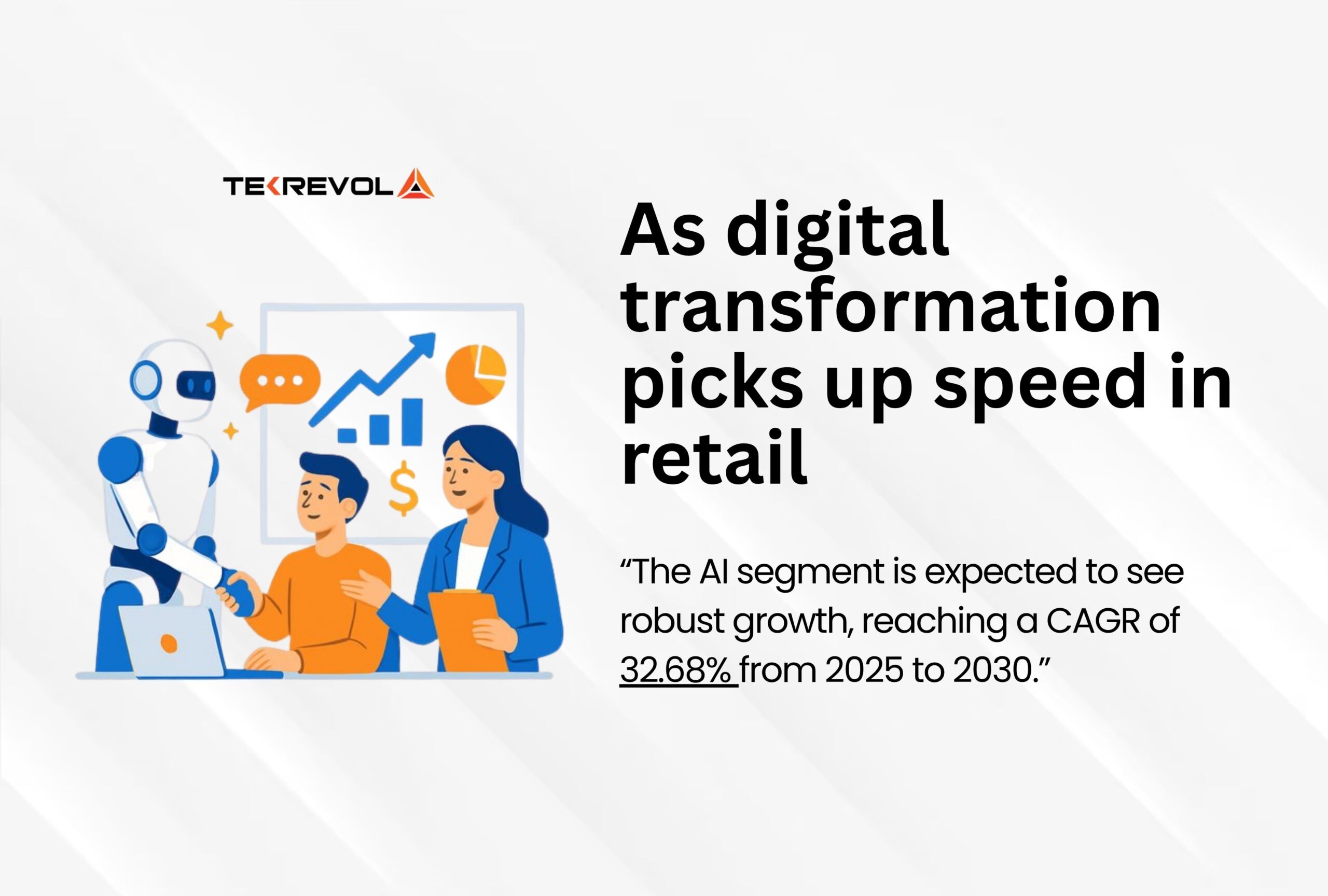
The following are the key AI agent applications revolutionizing the retail sector:
1. Personalized Product Recommendations
The AI-based agents analyze the shopping behavior, past purchases, and current interactions to customize product suggestions to all shoppers. This amount of personalization significantly will improve interaction and sales.
McKinsey estimates that 35% of Amazon’s sales come from its AI-driven recommendation engine.
How it helps:
- Increases customer satisfaction by offering relevant product suggestions
- Grows conversion rates and average order value
- Establishes brand loyalty through a more personalized shopping experience
2. Forecasting and Inventory
AI agents enable retailers to forecast stock requirements with precision by analyzing trends, seasonal trends, and even weather patterns. Walmart, for example, uses AI to enhance replenishment of stock, which leads to a 10–15% decrease in overstocking and out-of-stock conditions.
How it Helps:
- Reduces waste and inventory cost
- Enhances shelf availability
- Decreases manual forecasting errors
3. Smarter Customer Service
AI-driven virtual agents and chatbots now manage anything from order status to return and refund handling. These agents address complaints in real time and reduce support center volumes.
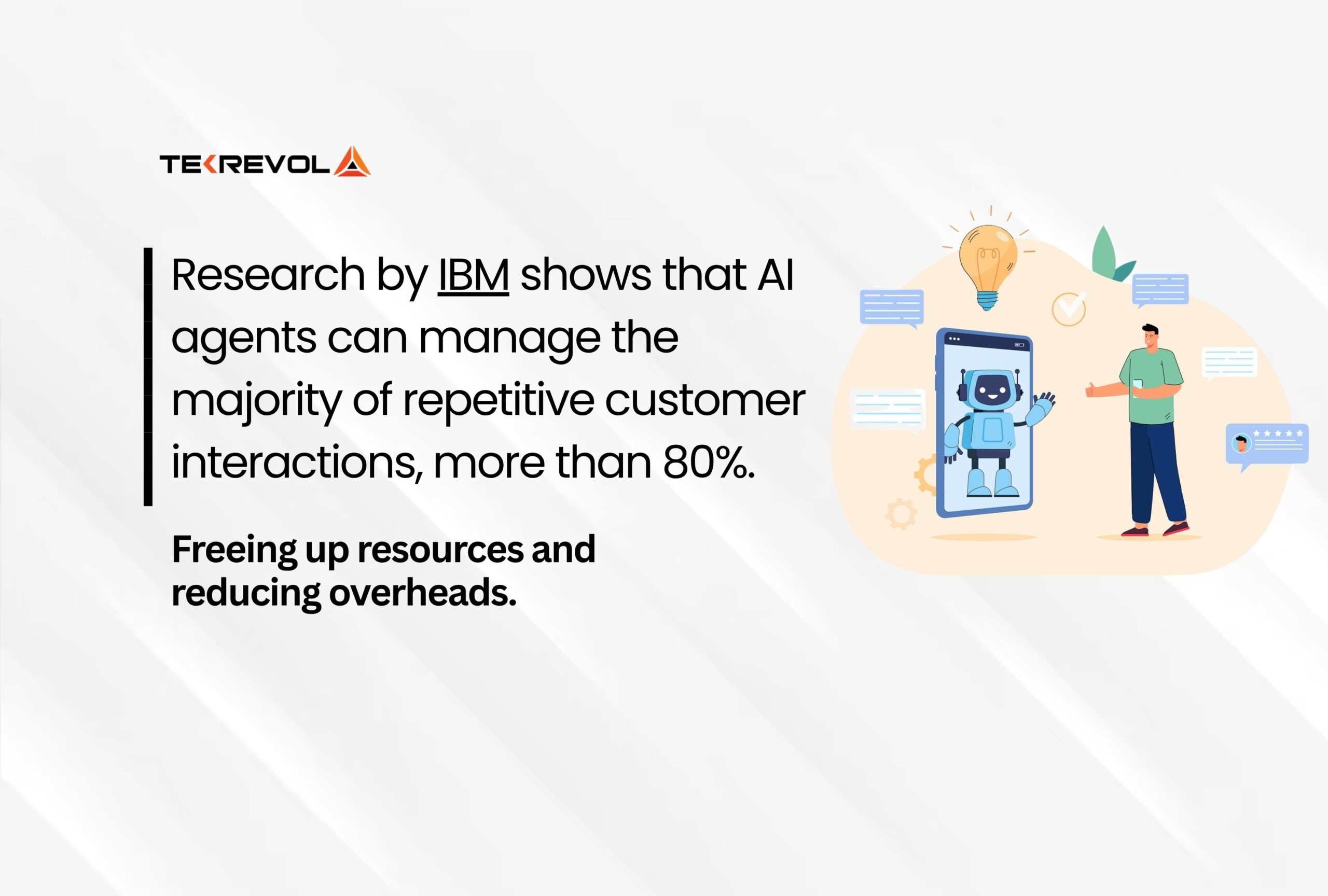
How it helps:
- Offers 24/7 customer service
- Decreases wait times and increases satisfaction
- Reduces customer service labor costs
4. Dynamic Pricing Optimization
AI-powered agents examine rival pricing, consumption trends, and market changes to vary product prices in real time. Merchants employing dynamic pricing have experienced up to 25% revenue growth.
How it helps:
- Boosts competitiveness and profitability
- Responds in real time to market fluctuations
- Optimizes revenue per item
5. Fraud Detection and Prevention
AI agents track transactional behavior and identify questionable activity in real-time. AI-driven fraud detection will reduce retailers’ financial losses by more than $10 billion per year by 2027, saving them money through lowered false positives and quicker alerts, Juniper Research believes.
How it helps:
- Improves payment security
- Decreases losses due to fraudulent transactions
- Establishes trust with customers
6. In-Store Behavior Analysis
Retailers are employing AI vision systems to monitor how consumers move around physical stores. This information is used for shelf placement, product bundling, and signage.
How it helps:
- Optimizes store layouts
- Improves shopper experience
- Boosts sales per square foot
7. Hyper-Personalized Marketing Campaigns
AI agents personalize emails, advertisements, and offers according to user choice and behavior. Salesforce indicates that marketers who utilize AI personalization platforms experience a 20% boost in ROI across their campaigns.
How it helps:
- Drives improved engagement across channels.
- Increases email open and click-through rates
- Improves campaign success at scale
8. Point of Sale (POS) Systems
Smart POS systems with AI agents don’t just take payments; they examine buying behavior in real time, identify potential upsell opportunities, and initiate suitable product offers at checkout.
How it helps:
- Streamlines checkout with personalized product prompts
- Monitors real-time purchasing trends
- Optimizes customer retention with personalized incentives
9. E-commerce Platforms
AI agents are transforming how online stores engage with customers in the sphere of e-commerce. To recommend products that match actual personal tastes, these intelligent systems monitor user activity, browsing history, wishlists, and prior purchases, among others. Beyond suggestions, AI agents are making the entire shopping process more efficient.
How it helps:
- Improves product discovery
- Bolsters checkout efficiency
- Enhances cart recovery using intelligent nudges
10. Retail Analytics & Business Intelligence (BI)
AI agents in BI solutions dig through sales, customer, and market data to identify trends, segment customers, and forecast evolving preferences. Embedding AI across retail operations could lead to a 133% increase in retail revenue contribution from AI between 2023 and 2027
How it helps:
- Facilitates proactive decision-making
- Provides a granular understanding of customer behavior
- Gives better campaign performance monitoring
Retailers using AI-driven recommendations see up to 30% higher order values.
Partner with TekRevol to build an AI-powered retail experience that converts browsers into buyers.
Build Your AI Solution Now!How AI Agents Are Transforming the Finance Industry? Key Use Cases
In financial services, encompassing banking, insurance, asset management, securities, and credit card operations, AI agents are powering innovation in each area.
Want to go deeper into AI’s role in finance? Check out our blog: Best Strategies to Leverage Generative AI in Financial Services.
The following are some of the major applications of AI agents in the finance industry:
1. Fraud Detection and Prevention
AI agents work around the clock, tracking every transaction to flag unusual behavior. By examining historical behavior and anomalies, such systems preventively identify fraud in credit card, loan, and investment accounts.
How it helps:
- Blocks unauthorized transactions before they occur
- Reduces heavy manual review burden for compliance teams
- Learns and evolves with changing fraud methods
2. Credit Scoring and Risk Determination
AI agents review a wide array of data, from conventional credit history to unconventional digital traces, to more accurately and inclusively determine borrower risk.
How it helps:
- Facilitates quicker loan approvals
- Increases credit accessibility for underbanked communities
- Reduces default rates with more accurate risk profiles
3. RoBo-Advisors for Investment Planning
AI-enabled robo-advisors provide tailored portfolio management according to users’ objectives, risk appetite, and spending habits, all at scale and low costs.
How it helps:
- Provides 24/7 investment guidance
- Reduces human bias in financial decisions
- Presents affordable solutions for small investors
4. Smart Customer Support
AI virtual assistants and chatbots in finance provide answers to questions, assist with account access, report problems, and walk users through processes such as loan applications or card activation.
AI could reduce banks’ operating costs by 22% by 2023,” according to Accenture.
How it helps:
- Processes high-volume inquiries instantly
- Improves user experience through 24/7 availability
- Saves call center expense
5. Algorithmic Trading
AI agents analyze huge amounts of financial information within milliseconds to make trades on real-time intelligence, news occurrences, and forecasting models.
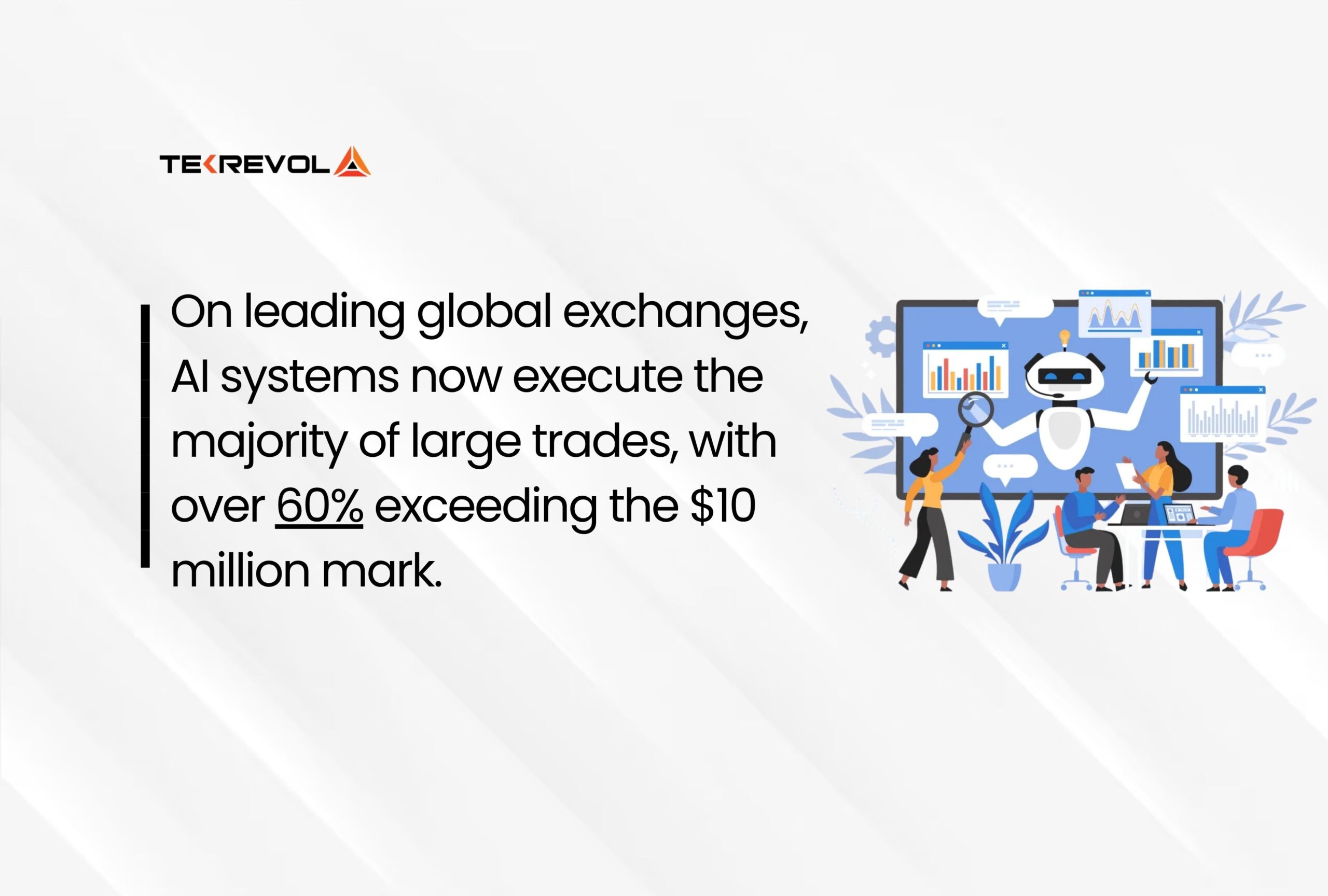
How it helps:
- Enhances trading velocity and precision
- Decreases emotional bias in investment choices
- Adjusts approach according to market trends
6. Regulatory Compliance Monitoring
AI agents run automated compliance checks by scanning documents, transactions, and communications for possible breaches and alerting to discrepancies. In a case study, IBM demonstrated that a financial institution implementing AI for regulatory compliance processes reduced cycle time by 80%, decreased errors by 10%, and improved data validation accuracy by 50%.”
How it assists:
- Reduces regulatory fines
- Reduces manual error in monitoring
- Catches up with changing laws and frameworks
7. Financial Forecasting & Planning
AI models mimic market trends, revenue forecasts, and cost patterns to assist corporate planning for finances and investment strategy.
How it benefits:
- Offers real-time scenario analysis
- Assists CFOs in making budgeting decisions based on data
- Enhances long-term financial security
8. Personalized Banking Experiences
AI agents personalize product offers, content, and recommendations to individual users based on transaction behavior and financial objectives.
How it assists:
- Increases customer satisfaction and loyalty
- Enhances product conversion rates
- Builds hyper-personalized engagement
9. Loan and Mortgage Underwriting
AI streamlines the underwriting process by examining credit risk, employment history, bank statements, and even social information.
How it benefits:
- Accelerates loan processing and approvals
- Improves decision-making with increased data points
- Eliminates manual paperwork and verification processes
10. Business Expense Management
AI agents assist businesses in monitoring expenditure patterns, identifying anomalies, grouping transactions, and creating real-time insights to enable intelligent financial control. Companies that utilize AI for expense management reduce the time taken to process by 70% for each expense report.
How it benefits:
- Reduces expense fraud
- Facilitates real-time budgeting
- Facilitates automated reimbursement processes
AI Agents are expected to handle 70% of banking queries.
Build your next-gen virtual assistant with TekRevol.
Build Your AI Agent Now!AI Agent Trends That Will Shape the Future of Healthcare, Finance, Retail & Beyond
The landscape of AI agents is evolving at great speed, and their future in healthcare, finance, retail, and the management of logistics, among others, is even more potentially disruptive. This is how the AI agents of tomorrow will be smarter, social, and more human-like.
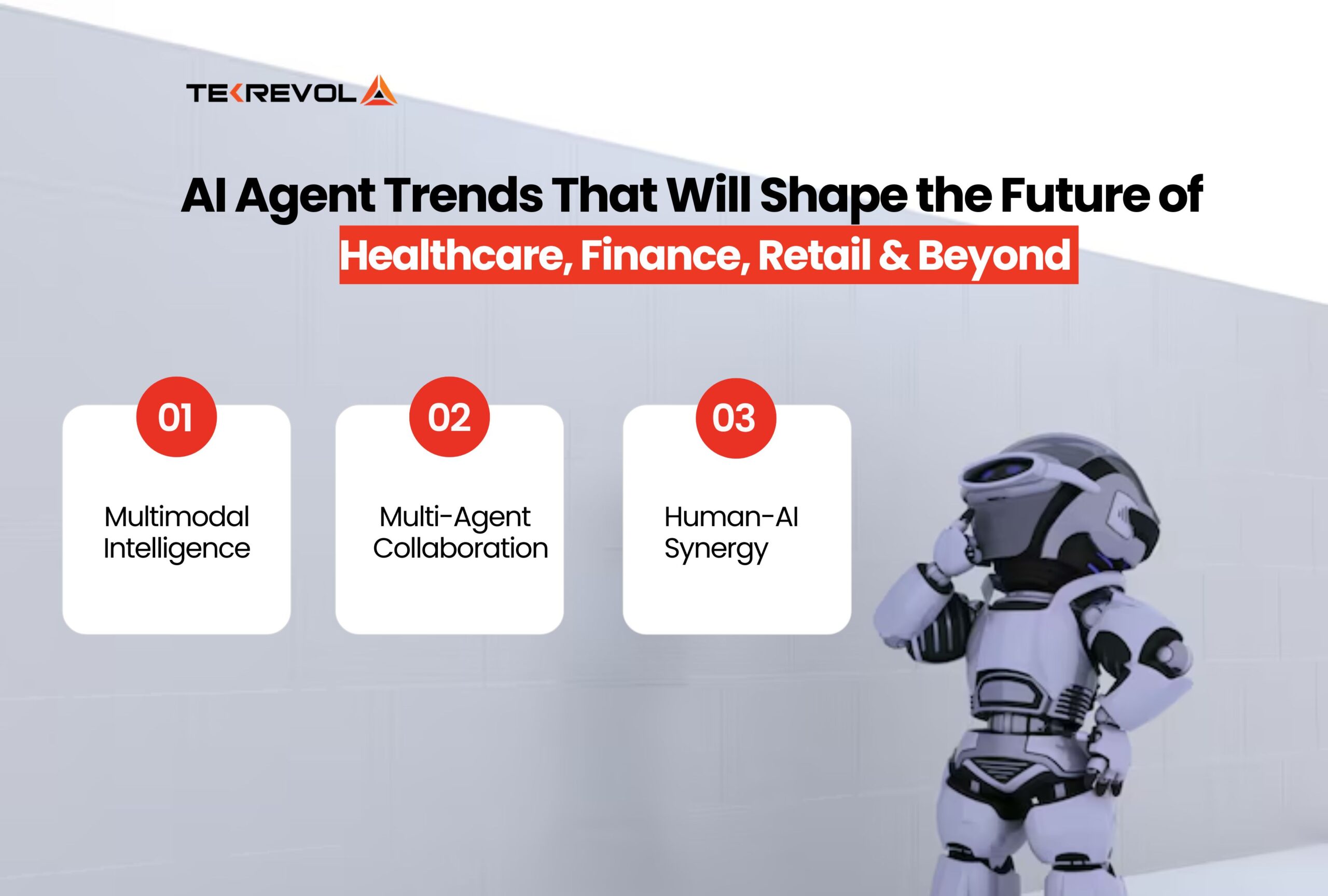
1. Multimodal Intelligence
Future AI agents will not rely on a single flow of data. All the time they will be interpreting and analyzing various different inputs such as reading and writing, pictures and voices, real-time signals and even biometrics.
- In medicine, it means agents that would pull the information found across imaging scans, patient history, and genomic data to provide quicker and more accurate diagnosis.
- Artificial intelligence will be used in the finance industry, where it will combine real-time market data, economic indicators, and the sentiments in news to forecast trends with higher precision.
- In retail, agents will know not only what your customer says but also how they act, providing intensely personal recommendations and effortless omnichannel experiences.
2. Multi-Agent Collaboration
The future isn’t just about smarter agents, it’s about smarter systems. We’ll see decentralized networks of AI agents that specialize in different tasks and work together to reach common goals.
- In medical environments, diagnostic, treatment, and monitoring agents will coordinate patient care across the continuum.
- In banking, trading agents will sync with compliance and risk management agents to ensure optimal, secure, and regulation-friendly operations.
- In order to speed up the whole customer lifecycle in eCommerce, AI agents will collaborate with marketing agents and customer service bots.
Such autonomous agent ecosystems will create an even more efficient, adaptable, and robust complex enterprise environments.
3. Human-AI Synergy
We are approaching a time when AI does not substitute humans, instead, it makes humans stronger. The agents will not only automate work, but rather assist the professionals in improving decisions.
- Seek AI that has the reasoning behind its decisions, which makes it easier to rely on and collaborate.
- The expected features will be transparency and explainability, especially in industries that are highly regulated, such as healthcare or the finance sector.
- Human workers will always be on the driver’s side as the AI takes care of the hard work with numbers, giving sharper, quicker operations all around.
Enterprises using AI are 1.5x more likely to lead in their sector.
Innovate with TekRevol and stay ahead with AI solutions built for real-world impact.
Book A FREE Consultation now!Partner with TekRevol to Build Future-Ready AI Agents
AI agents are no longer science fiction; they’re already impacting the real world across industries. They’re automating medical diagnoses and retail processes, optimizing them, and enhancing investment strategies in finance, among other applications.
However, it takes more than technology implementation to achieve such a high level of innovation; it requires a partner who understands your very own goals.
We at TekRevol specialize in designing and creating custom AI agents for your company and processes. As a leading AI agent development company, we have a well-established record of providing scalable, intelligent solutions to sectors in the healthcare, retail, finance, logistics, and more.
We work very closely with you to understand your business requirements, problems, and goals, ensuring that every AI solution we develop is as per your vision.
Need a virtual assistant that works 24/7?
We have a proven history of helping businesses automate support and boost customer satisfaction.
Get in Touch
